
Cannabidiol (CBD) shows promise in managing dementia symptoms, offering hope to patients and caregivers.
It may be challenging to determine the right dosage, but when you stick to microdosing cannabis, you can gently ease symptoms without compromising cognition and mood.
Cannabis has neuroprotective benefits: low doses can promote neurogenesis, safeguard your brain from memory loss, and help you feel relaxed and calm. Find out how our microdosed CBD gummies can help with dementia, and get dosage recommendations to keep you on track.
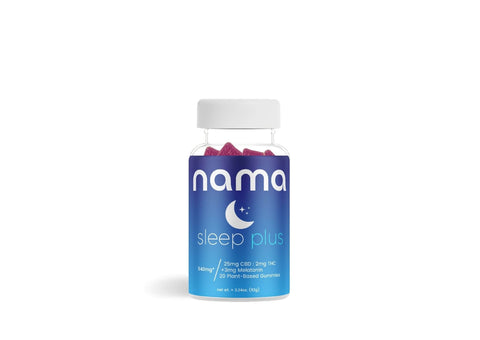
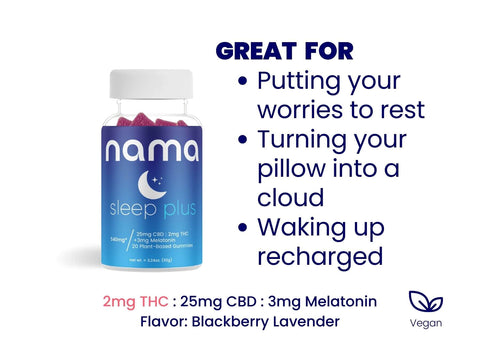
THC: 2 mg | CBD: 25 mg | Melatonin: 3 mg
What are the symptoms of dementia?
Dementia is a term used to describe a group of symptoms that affect memory, thinking, and social abilities severely enough to interfere with daily activities. It is caused by damage to or loss of nerve cells and their connections in the brain, which can occur due to diseases such as Alzheimer's disease, vascular dementia, or Lewy body dementia.
Dementia is progressive—the symptoms gradually worsen over time—and it primarily affects older adults, although it is not a normal part of aging. Symptoms may vary depending on the type of dementia and the person.
We've grouped dementia symptoms based on different categories:
Cognitive symptoms:
- Short-term memory loss and cognitive impairment
- Difficulty communicating or finding the right words
- Confusion and disorientation
- Difficulty with visual and spatial abilities
- Difficulty reasoning or problem-solving
- Difficulty handling complex tasks
- Difficulty with planning and organizing
Psychological symptoms:
- Personality changes or mood swings
- Anxiety and depression
- Inappropriate behavior and aggressive behavior
- Paranoia or hallucinations
- Agitation and restlessness
- Apathy or lack of interest in usual activities
Physical symptoms:
- Difficulty with coordination and motor functions, including aberrant motor behavior
- Sleep disturbances
- Changes in appetite and weight
There is growing interest in the potential therapeutic effects of cannabis for the treatment of dementia and associated physical and neuropsychiatric symptoms. THC has potential benefits for alleviating dementia symptoms, but we’re more interested in CBD.
How much CBD is enough to alleviate dementia-related anxiety, agitation, or sleep disturbances?
What is the best CBD dosage for dementia?
Low doses of CBD, typically up to 25 mg per day, are safe and well-tolerated in dementia patients. Lower CBD amounts may provide greater therapeutic benefits for demented patients than higher, uncontrolled doses. They may alleviate cognitive and behavioral symptoms of dementia without causing significant side effects or impairment that higher doses might produce.
According to a systematic review of Parkinson’s disease and dementia, CBD may help alleviate dementia symptoms in the following doses:
- 5 milligrams of CBD a day as a starting dose should help with anxiety. This amount can be increased slowly to the maximum of 90 milligrams of CBD a week.
- 5 milligrams of CBD a day also seems to help with agitation and aggression, with the maximum dose of 20 milligrams taken twice a week.
- 5 milligrams of CBD a day can also reduce sleep disturbances in dementia patients, with a maximum dose of 20 milligrams a day.
These guidelines aren't official medical recommendations. Most doctors don’t know how much CBD to prescribe to patients with dementia, as research is ongoing or there is limited evidence.
Other studies show a beneficial impact of CBD when combined with low doses of tetrahydrocannabinol (THC). In one pilot study, dementia patients were given cannabis oil with a combination of THC and CBD, starting at a dose of 7.6 mg of THC and 13.2 mg of CBD daily. Oral doses were gradually increased to 9 mg of THC and 18 mg of CBD by the end of two months. This combination improved behavior and rigidity in ten severely demented patients.
The synergistic effect of these two cannabinoids, known as the entourage effect, may enhance their therapeutic potential while minimizing the psychoactive effects associated with higher doses of THC. This synergy allows for a more balanced and effective treatment approach tailored to the needs of dementia patients.
If you’re seeking natural support for dementia symptoms, our Energy gummies employ the synergistic power of THC and CBD for a brighter, more energetic day. This entourage effect gummy pairs only 2.5 mg of THC with 5 mg of CBD for a balanced and invigorating experience.
When starting with any CBD gummy, always start with a low dose and gradually increase until you find your optimal dosage. This will minimize the risk of adverse effects and help you tap into your body’s unique response to CBD. Each person responds differently to cannabidiol, and the way CBD affects you depends on several factors.
What factors influence the dosage?
Factors that may influence CBD dosage for dementia include:
- Body weight can affect how CBD is metabolized and utilized in the body.
- Individual tolerance levels to CBD may vary, influencing the required dosage for symptom relief.
- The severity of dementia symptoms may necessitate higher or more frequent CBD dosages for effective management.
- Differences in metabolism can influence how quickly CBD is processed and eliminated from the body.
- Lifestyle factors such as diet, exercise, and stress levels can impact the body's response to CBD.
- Coexisting medical conditions may affect how CBD interacts with the body and influence dosage requirements.
- CBD may interact with certain medications, potentially affecting their efficacy or safety, necessitating dosage adjustments.
How can CBD help dementia patients?
Cannabidiol is a natural compound and a major cannabinoid found in the cannabis plant. It seems to offer a plethora of benefits for people with dementia. Unlike THC, CBD is non-psychoactive and won’t make you “high.”
CBD interacts with your endocannabinoid system (ECS) differently than Delta 9 THC. The endocannabinoid system is a complex network of receptors and compounds that regulate important bodily functions such as mood, sleep, appetite, and memory. CBD indirectly influences these receptors and ECS pathways to maintain balance and support overall health, including brain health.
Here’s how CBD interacts with the ECS to help alleviate symptoms of dementia:
CBD soothes the mind and alleviates agitation
Agitation and anxiety are common symptoms of dementia, often causing distress for patients and their caregivers. As the disease progresses, dementia patients may experience changes in their mood and behavior, making them feel restless, irritated, and afraid.
CBD’s anxiolytic properties may help in the treatment of agitation and anxiety. Outen, et. al. suggest that “[CBD and other cannabinoids] may relieve agitation by regulating neurotransmitters, improving comorbidities and circadian rhythms, and increasing cerebral circulation.” It interacts with the ECS to modulate the activity of serotonin and GABA, two neurotransmitters involved in mood. This promotes a sense of calm and relaxation, reducing the severity and frequency of these distressing symptoms.
If you want to relax, look no further than our CBD Relax gummies. Only 25 mg of CBD per delicious edible delivers a soothing experience, providing comfort and tranquility for those in need.
"Honestly, it is the one thing that has actually helped my anxiety while not causing an adverse reaction. I have tried meds, but have reacted badly to child-sized doses.
I am a bit amazed. This has been so helpful and so easy. Thank you, nama team!"
CBD reduces inflammation in the brain
Neuroinflammation can cause damage to brain cells and disrupt normal brain function, which can cause or worsen dementia. An inflamed brain produces harmful compounds called cytokines that can damage neurons and interfere with the communication between brain cells. Over time, chronic neuroinflammation can cause toxic proteins to accumulate. Some of those are beta-amyloid and tau, which are hallmarks of Alzheimer's disease and other forms of dementia.
CBD has anti-inflammatory properties that can help reduce inflammation in the brain. A 2022 study found that “CBD is relevant for treating neurodegenerative diseases since it can increase the activity of mitochondrial complexes and shows antioxidant and anti-inflammatory effects.”
CBD can help regulate sleep cycles
People with dementia often struggle with sleep. Their brains undergo changes that disrupt their natural sleep-wake cycle, leading to difficulty falling asleep and staying asleep, or experiencing altered sleep patterns. The anxiety, agitation, and discomfort associated with dementia further exacerbate sleep disturbances.
CBD products can help regulate sleep cycles. CBD interacts with the endocannabinoid system to reduce anxiety and agitation, create a sense of calm, and achieve more restful, restorative sleep. This ultimately leads to improved daytime functioning and overall quality of life.
Animal studies have shown that CBD can increase total sleep duration and alter REM sleep latency—it may help you sleep longer and influence the amount of time it takes to enter the dream (REM) stage of sleep. These effects depend on the dosage: lower doses of CBD may decrease the time it takes to enter REM sleep, while higher doses may increase it.
Other studies suggest the beneficial combination of CBD and THC for sleep. In a 2022 clinical trial, CBD counteracted the sedative effects of THC, especially at higher doses.
Our Sleep Plus gummies contain low amounts of THC (only 2 mg) and 25 mg of CBD to effectively optimize your sleep cycle, helping you sleep longer and enjoy more restorative sleep. We've made these gummies extra sleep-friendly by adding a touch of melatonin, another sleep compound that's sure to have you dozing off in no time.
CBD improves brain function
CBD may improve brain function in several ways:
- Cannabidiol may increase cerebral blood flow to deliver essential nutrients and oxygen to brain cells. Increased blood flow supports better cognitive function and overall brain health. A 2017 study found that short-term CBD treatment prevented cognitive and emotional impairments, reduced neurodegeneration and inflammation, and stimulated neurogenesis and brain plasticity in mice with insufficient blood flow in the brain.
- Together with THC, CBD promotes neurogenesis, the process of stimulating new brain cell growth. Studies reveal that CBD may help repair damage and replace lost cells in the nervous system, potentially offering a solution for neurodegenerative diseases such as dementia.
- CBD reduces the accumulation of toxic proteins such as beta-amyloid and tau. According to Burggren, et. al., “[THC and CBD] can promote neurogenesis, restore memory and prevent neurodegenerative processes and cognitive decline in animal models of Alzheimer’s disease.”
- CBD may be able to promote brain plasticity by modulating the activity of neurotransmitters and supporting the growth and maintenance of neural connections. Brain plasticity refers to the brain's ability to adapt and reorganize itself in response to new experiences and learning. This enhanced brain plasticity may contribute to better cognitive function and resilience in the face of age-related changes.
Analgesic properties of CBD for dementia patients
Whether it's the aches and pains of arthritis or the burning and tingling sensations of neuropathy, CBD's analgesic properties can provide much-needed pain relief in demented patients. CBD alleviates pain in three main ways:
- First, it reduces inflammation by interacting with ECS receptors and pathways. This interaction can help decrease pain associated with conditions such as arthritis.
- Second, CBD modulates the activity of neurotransmitters and receptors involved in pain signaling, such as serotonin and TRPV1, leading to reduced pain perception.
- Finally, CBD may enhance the effects of other pain-relieving compounds, such as morphine, through interactions with the endocannabinoid system and other receptors.
Unlike many prescription pain medications, CBD is generally well-tolerated and has a low risk of side effects, making it an attractive option for those who want to improve their overall well-being without adverse reactions.
Our Anytime CBD gummies, each containing only 10 mg of CBD, offer a gentle and effective way to alleviate chronic pain. With their precise dosage and delicious citrus lime taste, these gummies provide relief for those managing pain and cognitive challenges.
If you prefer a powerful THC and CBD combo to alleviate pain, our Bliss edibles contain a unique blend of hemp extracts, terpenes, flavonoids, and potent cannabinoids that elevate the spirit. Five milligrams of THC will provide mild euphoria and pain relief.
"I only bite off 1/4 of one and it's enough to take the edge off without feeling too "blissful." They taste good and arrive on time."
Product QUIZ
Need help deciding what product is best for you? Take our quiz, just three questions until your perfect match!
Does CBD have side effects?
CBD comes with minimal risk of side effects. The best way to avoid any side effects is to be mindful of your dosage and the content you're consuming. Certain factors influence how CBD interacts with your body, including weight, genetics, health conditions, and consumption methods.
If you take an extra high dose of CBD, you may experience some of the following side effects:
- Dry mouth
- Fatigue
- Upset stomach
- Decreased appetite
CBD may interact with other medications, particularly blood thinners, so if you’re on these types of medication, consult your healthcare provider before using CBD products.
Keep track of the products you use and opt for ones with clean ingredients. nama's™ vegan CBD gummies are hemp-derived, gluten-free, and made with real fruit.
Experience the difference with our edibles, where each bite is a burst of delicious flavor and wellness. Order from nama™ today.
Where to buy the best CBD gummies
If you’re looking to buy the best gummies to alleviate dementia symptoms, you've come to the right place. We deliver high-quality products with third-party lab tests that ensure purity and potency. Our edibles are unmatched in quality, efficacy, and flavor. We use real fruit to infuse our gummies—no bland or artificial flavors here. Just delicious, effective gummies made with care and science-backed ingredients.
Shop at nama™ and experience the benefits of low-dose cannabidiol for soothing relief from dementia symptoms.
CBD dementia FAQ
CBD may have potential benefits for memory, especially in the context of neurological conditions such as dementia and Alzheimer’s disease. CBD's neuroprotective, anti-inflammatory, and neurogenesis-promoting properties suggest it could mitigate memory deficits associated with neurodegeneration and brain injury. More robust human studies are needed to confirm these effects and determine the optimal CBD formulation and dosage for memory enhancement.
The best CBD product for dementia depends on the specific symptoms and stage of dementia. For instance, patients with severe dementia or aggressive behavior may benefit from a high-CBD medical cannabis oil or a balanced THC and CBD formulation. These CBD products address a broader range of neuropsychiatric symptoms. Milder cases may respond well to pure CBD oil or oral CBD doses. Always consult a medical professional experienced in cannabinoid therapy who can help identify the best product based on individual needs.
There is no direct evidence from clinical studies to suggest that CBD can improve IQ. CBD's potential neuroprotective effects and ability to promote neurogenesis and brain plasticity may theoretically support cognitive function in neurological conditions characterized by cognitive decline, such as Alzheimer's disease or vascular dementia. More targeted research is needed to evaluate CBD's impact on an individual’s intelligence quotient.
Preclinical studies suggest that CBD may slow Alzheimer’s disease progression by targeting multiple pathological processes. CBD's anti-inflammatory and antioxidant properties could help reduce neuroinflammation and oxidative stress. Its neuroprotective effects may inhibit the accumulation of amyloid beta plaques and neurofibrillary tangles.
The optimal CBD dosage for managing dementia symptoms varies depending on factors such as:
- The specific type and severity of dementia
- Individual tolerance
- The route of administration
Clinical studies have tested a wide range of doses, from as low as 2.5 mg/day to over 1000 mg/day, with most therapeutic effects observed in the range of 10-50 mg/day.
When you start with CBD products, start at the lowest effective dose and titrate gradually to minimize the risk of adverse effects. A medical professional can provide personalized dosing guidance based on a comprehensive evaluation.
CBD's neuroprotective and anti-inflammatory effects may create a more favorable environment for the proliferation and survival of new brain cells. CBD can promote neurogenesis, particularly in the hippocampus, a brain region critical for learning, memory, and emotional regulation. The extent and functional significance of CBD-induced neurogenesis in humans remains to be determined through further clinical studies.
At therapeutic doses used in most clinical trials, CBD is generally well-tolerated and unlikely to cause adverse effects such as brain fog or cognitive impairment. Every person reacts to CBD differently, and high doses of CBD may cause sedation or drowsiness in some people, which could be perceived as brain fog. The quality and purity of CBD products can influence the risk of adverse effects, so make sure you choose reputable sources and consult with a healthcare provider before use.
While some anecdotal reports suggest that CBD may help alleviate brain fog, scientific evidence is limited. CBD's potential anxiolytic, anti-inflammatory, and sleep-promoting properties could theoretically contribute to improved mental clarity and reduced brain fog in certain individuals.
The effects of CBD on brain fog likely depend on the underlying cause and individual factors. More targeted research is needed to elucidate CBD's impact on subjective cognitive symptoms like brain fog.
Both CBD and THC, the primary cannabinoids in marijuana, have shown promise in preclinical studies and small clinical trials for managing different aspects of dementia. CBD's neuroprotective, anti-inflammatory, and anxiolytic effects may help address neuropsychiatric symptoms, such as agitation, aggression, and mood disturbances in patients with advanced dementia. THC may offer benefits for pain, appetite, and sleep disturbances. CBD and THC together may provide a more comprehensive therapeutic approach for dementia and other neurodegenerative disorders.
In most clinical studies, a daily dose of 700mg CBD would be considered relatively high and may increase the risk of adverse effects, particularly in treatment-naïve individuals. Most health benefits are observed at lower doses, typically ranging from 10-100mg/day.
The safety and tolerability of CBD is different for every person. It depends on the person’s age, weight, metabolism, and concurrent medications. While clinical trials have tested doses up to 1,500mg/day without severe adverse effects, this does not imply that such high doses are necessary or optimal for therapeutic efficacy. Most experts recommend starting with a conservative dosage, such as 10-25mg/day, and adjusting incrementally until the desired effects are achieved with minimal side effects.
Top Sellers
New? Start with our Ultimate Sampler!

THC: 10 mg | CBC: 10 mg | CBD: 10 mg | CBG: 5 mg | CBN 5mg
Resources
Costa, A. C., G. Joaquim, H. P., C. Pedrazzi, J. F., Pain, O., Duque, G., & Aprahamian, I. (2022). Cannabinoids in Late Life Parkinson’s Disease and Dementia: Biological Pathways and Clinical Challenges. Brain Sciences, 12(12). https://doi.org/10.3390/brainsci12121596
Peprah, K., & McCormack, S. (2019, July 17). Medical Cannabinoids for the Treatment of Dementia: A Review of Clinical Effectiveness and Guidelines. NCBI Bookshelf. https://www.ncbi.nlm.nih.gov/books/NBK546328/
Outen JD, Burhanullah MH, Vandrey R, Amjad H, Harper DG, Patrick RE, May RL, Agronin ME, Forester BP, Rosenberg PB. Cannabinoids for Agitation in Alzheimer's Disease. Am J Geriatr Psychiatry. 2021 Dec;29(12):1253-1263. doi: 10.1016/j.jagp.2021.01.015. Epub 2021 Jan 27. PMID: 33573996; PMCID: PMC8313629.
Costa, A. C., G. Joaquim, H. P., C. Pedrazzi, J. F., Pain, O., Duque, G., & Aprahamian, I. (2022). Cannabinoids in Late Life Parkinson’s Disease and Dementia: Biological Pathways and Clinical Challenges. Brain Sciences, 12(12). https://doi.org/10.3390/brainsci12121596
Kaul, M., Zee, P. C., & Sahni, A. S. (2020). Effects of Cannabinoids on Sleep and their Therapeutic Potential for Sleep Disorders. Neurotherapeutics, 18(1), 217-227. https://doi.org/10.1007/s13311-021-01013-w
Nicholson AN, Turner C, Stone BM, Robson PJ. Effect of Delta-9-tetrahydrocannabinol and cannabidiol on nocturnal sleep and early-morning behavior in young adults. J Clin Psychopharmacol. 2004 Jun;24(3):305-13. doi: 10.1097/01.jcp.0000125688.05091.8f. PMID: 15118485.
Mori MA, Meyer E, Soares LM, Milani H, Guimarães FS, de Oliveira RMW. Cannabidiol reduces neuroinflammation and promotes neuroplasticity and functional recovery after brain ischemia. Prog Neuropsychopharmacol Biol Psychiatry. 2017 Apr 3;75:94-105. doi: 10.1016/j.pnpbp.2016.11.005. Epub 2016 Nov 23. PMID: 27889412.
Burggren, A. C., Shirazi, A., Ginder, N., & London, E. D. (2019). Cannabis effects on brain structure, function, and cognition: Considerations for medical uses of cannabis and its derivatives. The American Journal of Drug and Alcohol Abuse, 45(6), 563. https://doi.org/10.1080/00952990.2019.1634086
Xiong, Y., & Lim, S. (2021). Understanding the Modulatory Effects of Cannabidiol on Alzheimer’s Disease. Brain Sciences, 11(9). https://doi.org/10.3390/brainsci11091211
nama CBD FDA & legal disclaimer
Our products are not intended to diagnose, treat, cure, or prevent any disease. They are not a replacement for prescription medications and have not been evaluated by the Food and Drug Administration (FDA).
The information provided on this website does not and is not intended to, constitute legal advice or any statements of the status of any laws. Any information, content, and materials available on this site are for general informational purposes only and are not intended to be relied upon for any purpose.
Readers of this website should contact their attorney to obtain advice with respect to any particular legal matter including decisions on what products are, or are not, legal to sell, possess, or consume. No reader, user, or browser of this site should act or refrain from acting on the basis of information on this site without first seeking legal advice from their own counsel in the relevant jurisdiction.
Only your individual attorney can provide assurances that the information contained herein – and your interpretation of it – is applicable or accurate for your particular situation. Use of, and access to, this website or any of the links or resources contained within the site do not create an attorney-client relationship between the reader, user, or browser, and website authors, contributors, contributing law firms, or committee members and their respective employers.
More articles
About
Learn
Join us on this journey

© Copyright 2025 nama Products LLC. All Rights Reserved.
†These statements have not been evaluated by the Food and Drug Administration. These products are not intended to diagnose, treat, cure or prevent any disease. All information presented here is not meant as a substitute for or alternative to information from health care practitioners. Please consult your health care professional about potential interactions or other possible complications before using any product.
††The information provided on this website does not, and is not intended to, constitute legal advice or any statements of the status of any laws. Any information, content, and materials available on this site are for general entertainment purposes only, and are not intended to be relied upon for any purpose.

By clicking ‘Yes,’ you agree to our
Terms & Conditions and Privacy Policy
123 John Doe Street
Your Town, YT 12345
Store Hours
Sun: Closed
Mon-Fri: 9:00 - 17:00
Sat: 10:00 - 13:00
What to expect at pickup
Closed
Closing at 5pm
Closing at 5pm
Closing at 5pm
Closing at 5pm
Closing at 5pm
Closing at 1pm

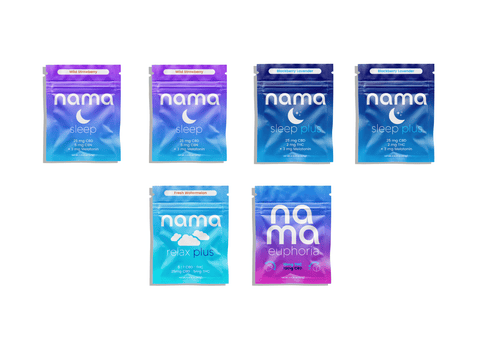
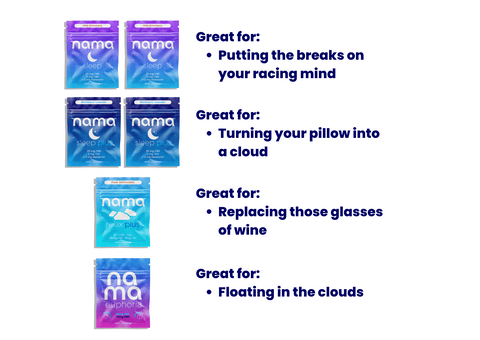
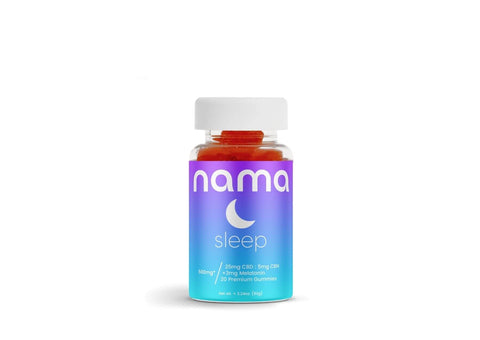
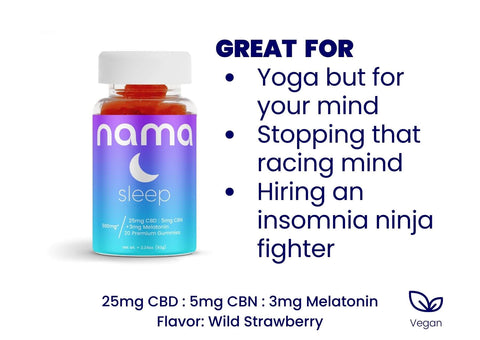
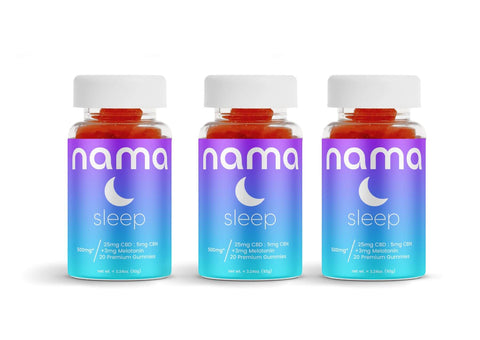
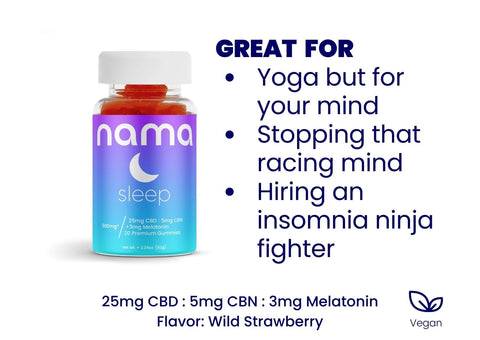








![Buzz Packs™ [THC and CBD Powder Drink Mix]](http://www.namacbd.com/cdn/shop/files/nama_buzz_packs_thc_drink_pack_white_background.png?v=1741884660&width=480)
![Buzz Packs™ [THC and CBD Powder Drink Mix]](http://www.namacbd.com/cdn/shop/files/Buzz_Packs_Label.png?v=1741884660&width=480)
![Buzz Drops™ [THC Drink Drops]](http://www.namacbd.com/cdn/shop/files/nama_thc_buzz_drops.png?v=1711412866&width=480)
![Buzz Drops™ [THC Drink Drops]](http://www.namacbd.com/cdn/shop/files/buzz-drop-wine-comparison.png?v=1736882023&width=480)
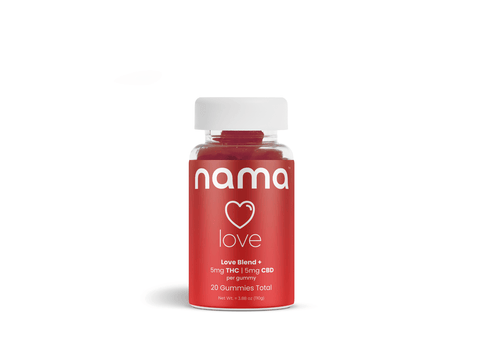



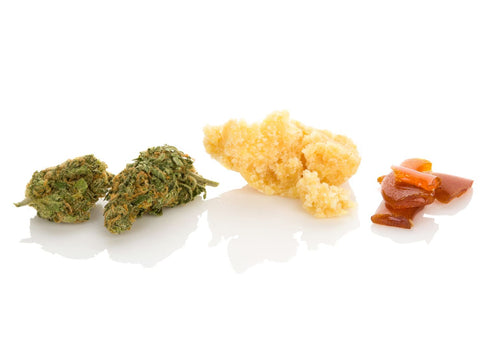


Comments (0)
There are no comments for this article. Be the first one to leave a message!